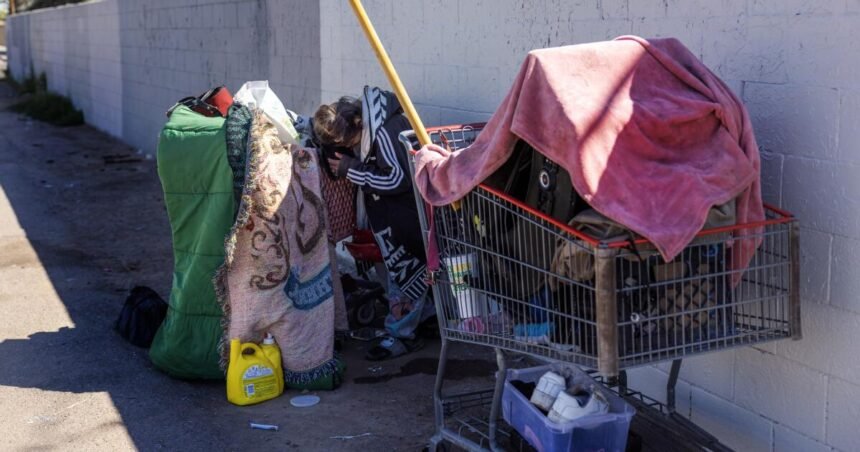Arizona voters approved a first-in-the-nation ballot initiative aimed at forcing local police to crack down harder on homeless encampments.
The statewide initiative, which was leading 58% to 42% as of Thursday afternoon, seeks to provide tax rebates to property owners if they can prove local governments’ failure to enforce nuisance laws resulted in monetary losses.
It’s unclear how much of a real impact the measure, which takes effect on Jan. 1, will have on tax revenue, but both supporters and opponents see it as symbolically important as cities across the country grapple with growing homelessness crisis. Even if taxpayers don’t ultimately receive refunds, people on both sides of the issue believe the measure could prompt police departments to take more aggressive action to dismantle encampments.
Homeless advocates say solutions include building more housing and that those experiencing homelessness are being unfairly targeted and stigmatized. Supporters of more punitive measures say homelessness is out of control and quality of life is suffering as cities become more lax in enforcing laws banning camping and public drug and alcohol abuse.
“This just goes to show that property owners in Arizona are tired of the status quo and they want local government to be held accountable,” said Jenna Bentley, director of public affairs for the Goldwater Institute, a conservative group that sponsored the measure. ) explain. “I hope this sends a real message to the city that taxpayers will not tolerate issues like homelessness, drug abuse and public drunkenness being ignored.”
Bentley said her organization has received inquiries from groups and lawmakers in other states interested in replicating the measure. But she was unaware of any efforts being made.
The purpose of the law is that if property owners can prove they were harmed by a failure to enforce laws prohibiting loitering, panhandling, camping and public drinking, they can seek rebates on costs such as safety fences. Lost business income will not be eligible for compensation.
But enforcement of the law depends on establishing an enforcement process, which has yet to be completed and could be cumbersome.
Amy Schwabenlender, executive director of Changing Keys, a Phoenix-area homeless services organization, said she doubts the bill will take effect.
“If implemented, it would certainly not help homeless people,” she said.
The threat of arrest only forces homeless people to move around more often and lose contact with outreach workers who can help them find shelter and other services, she said.
Schwabenlund sees the ballot measure as part of a larger pushback against housing-focused strategies.
“We have defended those who claim that all homeless people use illegal drugs or suffer from mental illness,” she said. “We have to do more messaging around this framework.”
A spokesperson for the city of Phoenix said in an email that it was unable to determine the impact of the new law, known as Proposition 312, on the city’s budget.
“Proposition 312 does not change the city’s commitment to taking a leadership role in education and services and not criminalizing homelessness,” said Communications Director Dan Wilson. He said the city’s Office of Homeless Solutions is committed to “addressing encampments in a dignified and compassionate manner that serves our most vulnerable residents while preserving the quality of life for all residents of our community.”
Proposition 312 comes after a successful lawsuit last year forced the city to clean up homeless encampments spanning several blocks of downtown Phoenix, known as “zones.”
The ballot measure’s approach stands in stark contrast to measures in other states asking taxpayers to spend more money on homeless services, including a measure approved by Los Angeles County voters on Tuesday that would allow voters in 2017 to The approved 25-cent sales tax is doubled.

